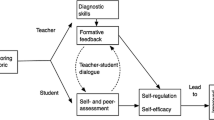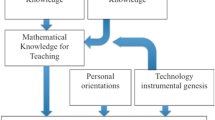Abstract
The multi-faceted nature of mathematics knowledge for teaching, including pedagogical content knowledge (PCK), has been studied widely in elementary classrooms, but little research has focused on senior secondary mathematics teaching. This study utilised the Knowledge Quartet (Rowland et al., Research in Mathematics Education, 17(2), 74–91, 2005) to analyse mathematics teaching at the senior secondary level using excerpts from a lesson on differential calculus and another on discrete probability distributions. The findings reveal that, at this level, there is a complex interplay among aspects of the Knowledge Quartet, including the impact of foundational knowledge on contingent moments. Horizon content knowledge is shown to play an important role in teaching decisions, as do perceived constraints. This has implications for future research into how teachers’ horizon knowledge might be expanded and into teachers’ perceptions of mathematics course constraints on the enactment and development of their mathematics knowledge for teaching.

Similar content being viewed by others
Data availability
The material presented in this paper was drawn from the data generated in a wider PhD investigation. The thesis is available at https://eprints.utas.edu.au/31741/.
Code availability
Not applicable
References
Australian Curriculum, Assessment and Reporting Authority. (2020). Senior secondary mathematics subjects. https://www.australiancurriculum.edu.au/senior-secondary-curriculum/mathematics/senior-secondary-mathematics-subjects/.
Baker, M., & Chick, H. L. (2006). Pedagogical content knowledge for teaching primary mathematics: A case study of two teachers. In P. Grootenboer, R. Zevenbergen, & M. Chinnappan (Eds.), 29th conference of the Mathematics Education Research Group of Australasia. Mathematics Education Research Group of Australasia Inc.
Ball, D. L., & Bass, H. (2000). Interweaving content and pedagogy into teaching and learning to teach: Knowing and using mathematics. In J. Boaler (Ed.), Multiple perspective on the teaching and learning of mathematics (pp. 83–104). Ablex.
Ball, D., Lubienski, S., & Mewborn, D. (2001). Research on teaching mathematics: The unsolved problem of teachers’ mathematical knowledge. Handbook of Research on Teaching, 4, 433–456.
Ball, D. L., Thames, M. H., & Phelps, G. (2008). Content knowledge for teaching: What makes it special? Journal of Teacher Education, 59, 389–407.
Chick, H., Baker, M., Pham, T., & Cheng, H. (2006). Aspects of teachers’ pedagogical content knowledge for decimals. In J. Novotna, H. Moraova, M. Kratka, & N. Stehlikova (Eds.), Proceedings of the Conference of the International Group for the Psychology of Mathematics Education (30th, Prague, Czech Republic, July 16-21, 2006) (Vol. 2, pp. 297–304). Charles University in Prague.
Chick, H. & Beswick, K. (2017). Teaching teachers to teach Boris: A framework for mathematics teacher educator pedagogical content knowledge. Journal of Mathematics Teacher Education.https://doi.org/10.1007/s10857-016-9362-y
Fennema, E., & Franke, M. L. (1992). Teachers’ knowledge and its impact. In D. A. Grouws (Ed.), Handbook of research on mathematics teaching and learning (pp. 147–164). Macmillan.
Gess-Newsome, J. (2015). A model of teacher professional knowledge and skill including PCK: Results of the thinking from the PCK Summit. In J. Loughran, P. Friedrichsen, & A. Berry (Eds.), Re-examining pedagogical content knowledge in science education. Routledge.
Grossman, P. (1990). The making of a teacher: Teacher knowledge and teacher education. Teachers College Press.
Grossman, P. L., & Stodolsky, S. S. (1995). Content as context: The role of school subjects in secondary school teaching. Educational Researcher, 24(8), 5–23. https://doi.org/10.2307/1176887
Hashweh, M. (2005). Teacher pedagogical constructions: A reconfiguration of pedagogical content knowledge. Teachers and Teaching, 11(3), 273–292. https://doi.org/10.1080/13450600500105502
Hill, H., Ball, D., & Schilling, S. (2008). Unpacking pedagogical content knowledge: Conceptualizing and measuring teachers’ topic-specific knowledge of students. Journal for Research in Mathematics Education, 39(4), 372–400.
Hodgson, B., Karanikolas, N., Langsford-Willing, B., Duncan, M., Herft, T., Kempton, L., Nolan, J., & Phillips, G. (2013). Maths quest 12 mathematical methods CAS (2nd ed.). John Wiley & Sons.
Kendal, M., & Stacey, K. (2001). The impact of teacher privileging on learning differentiation with technology. International Journal of Computers for Mathematical Learning, 6, 143–165.
Kunter, M., Baumert, J., Blum, W., Klusmann, U., Krass, S., & Neubrand, M. (Eds.). (2013). Cognitive activation in the mathematics classroom and professional competence of teachers. Springer.
Liston, M. (2015). The use of video analysis and the knowledge quartet in mathematics teacher education programmes. International Journal of Mathematical Education in Science and Technology, 46(1), 1–12. https://doi.org/10.1080/0020739X.2014.941423
Livy, S. (2010). A ‘knowledge quartet’ used to identify a second-year pre-service teacher’s primary mathematical content knowledge. In L. Sparrow, B. Kissane, & C. Hurst (Eds.), Shaping the future of mathematics education: Proceedings of the 33rd annual conference of the Mathematics Education Research Group of Australasia (pp. 344–351). MERGA.
Magnusson, S., Krajcik, J., & Borko, H. (1999). Nature, sources, and development of pedagogical content knowledge for science teaching. In J. Gess-Newsome & N. G. Lederman (Eds.), Examining pedagogical content knowledge (pp. 95–132). Springer.
Maher, N., Muir, T., & Chick, H. (2015a). Examining PCK in a senior secondary mathematics lesson. In M. Marshman, V. Geiger, & A. Bennison (Eds.), Mathematics education in the margins: Proceedings of the 38th annual conference of the Mathematics Education Research Group of Australasia (pp. 389–396). MERGA.
Maher, N., Muir, T., & Chick, H. (2015b). Secondary mathematics students’ perceptions of their teachers’ pedagogical content knowledge for teaching aspects of probability. In K. Beswick, T. Muir, & J. Wells (Eds.), Proceedings of the 39th Conference of the International Group for the Psychology of Mathematics Education (pp. 4–18). PME.
Maher, N., Chick, H., & Muir, T. (2016) “I believe the most helpful thing was him skipping over the proof”: Examining PCK in a senior secondary mathematics lesson. In B. White, M. Chinnappan, & S. Trenholm (Eds.), Opening up mathematics education research: Proceedings of the 39th annual conference of the Mathematics Education Research Group of Australasia (pp. 421–428). MERGA.
Mason, J., & Spence, M. (1999). Beyond mere knowledge of mathematics: The importance of knowing-to act in the moment. Educational Studies in Mathematics, 38, 135–161.
McDuffie, A. R. (2004). Mathematics teaching as a deliberate practice: An investigation of elementary pre-service teachers’ reflective thinking during student teaching. Journal of Mathematics Teacher Research, 7(1), 33–61. https://doi.org/10.1023/B:JMTE.0000009970.12529.f4
Park, S., & Oliver, J. S. (2008). Revisiting the conceptualisation of pedagogical content knowledge (PCK): PCK as a conceptual tool to understand teachers as professionals. Research in Science Education, 38(3), 261–284. https://doi.org/10.1007/s11165-007-9049-6
Petrou, M. (2009). Adapting the knowledge quartet in the Cypriot mathematics classroom. In V. Durand-Guerrier, S. Soury-Lavergne, & F. Arzarello (Eds.), CERME 6 – working group 10: Mathematical curriculum and practice (pp. 2020–2029). Institut National De Recherche Pédagogique.
Petrou, M., & Goulding, M. (2011). Conceptualising teachers’ mathematical knowledge in teaching. In T. Rowland & K. Ruthven (Eds.), Mathematical knowledge in teaching. (Mathematics education library, Vol. 50, pp. 83–96). Springer. https://doi.org/10.1007/978-90-481-9766-8_2
Potari, D., Zachariades, T., Christou, C., Kyriazis, G., & Pitta-Pantazi, D. (2007). Teachers’ mathematical knowledge and pedagogical practices in the teaching of derivative. In D. Pitta-Pantazi & C. Philippou (Eds.), Proceedings of the fifth congress of the European Society for Research in Mathematics Education (pp. 1955–1964). University of Cyprus and ERME.
Rowland, T. (2008). Researching teachers’ mathematics disciplinary knowledge. In P. Sullivan & T. Wood (Eds.), Knowledge and beliefs in mathematics teaching and teaching development (Vol. 1, pp. 273–298). Sense Publishers.
Rowland, T. (2013). The knowledge quartet: The genesis and application of a framework for analysing mathematics teaching and deepening teachers’ mathematics knowledge. The Professional Practice and Professional Development of Mathematics Teachers, 1(3), 15–43. https://doi.org/10.25749/sis.3705
Rowland, T., Huckstep, P., & Thwaites, A. (2005). Elementary teachers’ mathematics subject knowledge: The knowledge quartet and the case of Naomi. Journal of Mathematics Teacher Education, 8(3), 255–281. https://doi.org/10.1007/s10857-005-0853-5
Rowland, T., Jared, L., & Thwaites, A. (2011). Secondary mathematics teachers’ content knowledge: The case of Heidi. In M. Pytlak, T. Rowland & E. Swoboda (Eds.), Proceedings of the seventh congress of the European Society for Research in Mathematics Education (pp. 2827–2837). University of Rzeszow.
Rowland, T., Thwaites, A., & Jared, L. (2015). Triggers of contingency in mathematics teaching. Research in Mathematics Education, 17(2), 74–91.
Shulman, L. (1986). Those who understand: Knowledge growth in teaching. Educational Researcher, 15(2), 4–14. https://doi.org/10.2307/1175860
Shulman, L. S. (1987). Knowledge and teaching: Foundations of the new reform. Harvard Educational Review, 57(1), 1–22.
Shulman, L. (2015). PCK: Its genesis and exodus. In A. Berry, P. Friedrichsen, & J. Loughran (Eds.), Re-examining pedagogical content knowledge in science education (pp. 11–20). Routledge.
Stake, R. E. (1995). The art of case study research. SAGE Publications.
Zazkis, R., & Mamolo, A. (2011). Reconceptualising knowledge at the mathematical horizon. For the Learning of Mathematics, 31(2), 8–13.
Author information
Authors and Affiliations
Contributions
Nicole Maher was the PhD candidate who conducted the research upon which this paper is based. Nicole’s PhD was supervised by Tracey Muir and Helen Chick. Nicole Maher produced the first draft of this paper with Tracey Muir and Helen Chick drafting additional sections. All authors read and approved the final paper. All authors contributed to the study’s conception and design.
Corresponding author
Ethics declarations
Competing interests
The authors declare no competing interests.
Additional information
Publisher's Note
Springer Nature remains neutral with regard to jurisdictional claims in published maps and institutional affiliations.
Rights and permissions
About this article
Cite this article
Maher, N., Muir, T. & Chick, H. Analysing senior secondary mathematics teaching using the Knowledge Quartet. Educ Stud Math 110, 233–249 (2022). https://doi.org/10.1007/s10649-021-10125-1
Accepted:
Published:
Issue Date:
DOI: https://doi.org/10.1007/s10649-021-10125-1




